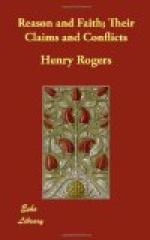____
* The case of the Gipsies, often alleged as a parallel, is a ludicrous evasion of the argument. These few and scattered vagabonds, whose very safety has been obscurity and contempt, have never attracted towards them a thousandth part of the attention, or the hundred thousandth part of the cruelties, which have been directed against the Jews. Had it been otherwise, they would long since have melted away from every country in Europe. We repeat that the existence of a nation for 1800 years in the bosom of all nations, conquered and persecuted, yet never extinguished, and the propagation of a religion amongst different races without force, and even against it,—are both, so far as known, paradoxes in history. + ‘They may say,’ says Butler, ’that the conformity between the prophecies and the event is by accident; but there are many instances in which such conformity itself cannot be denied.’ His whole remarks on the subject, and especially those on the impression to be derived from the multitude of apparent coincidences, in a long series of prophecies, some vast, some minute; and the improbability of their all being accidental are worthy of his comprehensive genius. It is on the effect of the whole, not on single coincidences, that the argument depends. ____
Once more then; if, from the external evidences of this religion, we pass to those which the only records by which we know any thing of its nature and origin supplies, the infidel must believe, amongst other paradoxes, that it is probable that a knot of obscure and despised plebeians—regarded as the scum of a nation which was itself regarded as the scum of all other nations—originated the purest, most elevated, and most influential theory of ethics the world has ever seen; that a system of sublimest truth, expressed with unparalleled simplicity, sprang from ignorance; that precepts enjoining the most refined sanctity were inculcated by imposture; that the first injunctions to universal love broke from the lips of bigotry! He must further believe that these men exemplified the ideal perfection of that beautiful system in the most unique, original, and faultless picture of virtue ever conceived—a picture which has extorted the admiration even of those who could not believe it to be a portrait, and who have yet confessed themselves unable to account for it except as such.* He must believe, too, that these ignorant and fraudulent Galileans voluntarily aggravated the difficulty of their task, by exhibiting their proposed ideal, not by bare enumeration and description of qualities, but by the most arduous of all methods of representation—that of dramatic action; and, what is more, that they succeeded; that in that representation they undertook to make him act with sublime consistency in scenes of the most extraordinary character and the most touching pathos, and utter moral truth in the most exquisite fictions in which such truth was ever embodied; and that again they succeeded;




